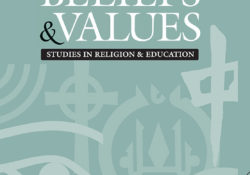
tandfonline.com har udgivet en rapport under søgningen “Teacher Education Mathematics”: ABSTRACT ABSTRACT Subject marginalisation is an on-going concern across the primary education sector, particularly for the arts and humanities. This poses issues for pre-service teacher partnerships and for higher education institutions (HEIs) evaluating the role of subjects within their teacher training courses as they reform their curricula to prepare students to teach across diverse educational contexts. Through the interpretation of student voice, we disseminate a case study with primary initial teacher education (ITE) students that investigates learner perceptions of their training in under-represented foundation subjects. Emerging themes include tensions between university and school-based practices, and between curriculum models, together with the need to develop student adaptability and self-direction. The authors propose that if ITE students explore and take on the… Continue Reading →
Like this:
Like Loading...
tandfonline.com har udgivet en rapport under søgningen “Teacher Education Mathematics”: ABSTRACT ABSTRACT This article argues that crucial elements of the three most important theoretical models of twentieth-century education can be traced back to three Protestant denominations that were developed in Europe in the sixteenth and seventeenth centuries. First, rather than to look in depth at the Protestant Reformers’ own educational ideas, the paper examines their perceptions of how the social or political order should be governed as appropriate for salvation. It then shows how educational models became possible in the context of the three Protestant denominations as they morphed across time and space: German Lutheranism and how it eventually gave rise to the theory of Bildung, which goes hand in hand with the dual world view of Lutheranism; the political… Continue Reading →
Like this:
Like Loading...
eric.ed.gov har udgivet: This report documents the results of an evaluation of the Future Foundations Society CIC (Future Foundations) academic summer school which took place in August 2013. The Future Foundations summer school programme is a literacy and numeracy catch-up intervention which provided extra schooling in the summer holidays. Pupils attending the four-week programme followed a specially designed curriculum involving regular literacy and numeracy lessons taught by trained primary and secondary school teachers. The programme took place in the summer of 2013 across three sites in London and the South East: Brighton, Enfield, and Islington. It was targeted at pupils in Years 5 and 6 who were eligible for free school meals (FSM) and at pupils who had not achieved Level 4 in English or maths at the end of… Continue Reading →
Like this:
Like Loading...
eric.ed.gov har udgivet: The number of jobs in science, technology, engineering, and math (STEM) is growing rapidly and is expected to increase by approximately 1 million in the United States between 2012 and 2022 (Vilorio, 2014). People of many racial/ethnic minorities, however, including Hispanic people, are underrepresented among recipients of STEM degrees and among employees in STEM fields (Beede et al., 2011). Regional Educational Laboratory Southwest conducted this review of the research literature to identify malleable factors that can be measured in K-12 settings and that predict students’ postsecondary STEM success (defined as enrolling in, persisting in, and completing a postsecondary STEM major or degree), particularly for Hispanic students. Identifying these predictive malleable factors can help policymakers and district and school administrators develop and implement interventions that increase the percentage… Continue Reading →
Like this:
Like Loading...
eric.ed.gov har udgivet: National studies reveal that 50 percent to 70 percent of community college students are required to take developmental, or remedial, math courses upon enrollment, and only 20 percent of developmental math students ever successfully complete a college-level math course. Taking up the challenge is the “New Mathways Project” (NMP), developed by the Charles A. Dana Center at the University of Texas at Austin in partnership with the Texas Association of Community Colleges. This new initiative aims to change the standard pathways to and through colleges’ traditional math sequences. This report analyzes the development of the “New Mathways Project” (NMP) from spring 2012 through its first year of rollout at nine colleges in Texas in 2013-2014, as well as student outcomes at the colleges before and during the… Continue Reading →
Like this:
Like Loading...
tandfonline.com har udgivet en rapport under søgningen “Teacher Education Mathematics”: Abstract The purpose of this special issue is to demonstrate the depth and breadth of the ways that sound considerations can significantly contribute to the field of Educational Foundations. An interdisciplinary and international field, Sound Studies has tackled subfields and themes familiar to those who work in educational foundations. For example, there has been work on sound histories, sound philosophies, sound culture, sound/race, and sound methodologies. As noted in a recent article in the twentieth anniversary issue of Qualitative Inquiry, there has also been a burgeoning attention to sound scholarship in education. Not dissimilar to a similar move made in curriculum studies, contributors to this issue will attend to and otherwise explore sound possibilities for educational theory, policy and practice.… Continue Reading →
Like this:
Like Loading...
eric.ed.gov har udgivet: The National Science Foundation’s Math and Science Partnership (MSP) program (NSF, 2012) supports partnerships between K-12 school districts and institutions of higher education (IHEs) and has been funding projects to improve STEM education in K-12 since 2002. As of 2011, a total of 178 MSP projects have received support as part of a STEM education investment of over $900 million. One important movement over the past decade has been increasing interest in incorporating engineering and design content in K-12 teaching and learning, a strategy validated in the National Research Council report, “A Framework for K-12 Science Education: Practices, Crosscutting Concepts and Core Ideas” (NRC, 2011). The goals of K-12 engineering and design content traditionally have been to prepare students to think critically, creatively, and independently by solving… Continue Reading →
Like this:
Like Loading...


